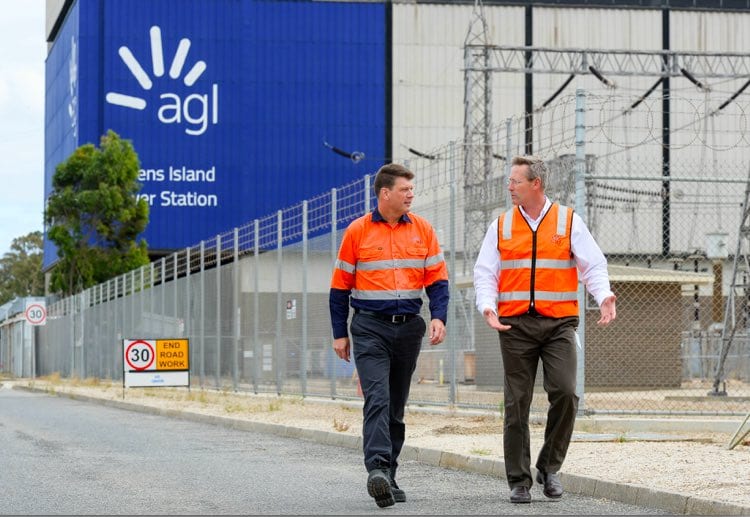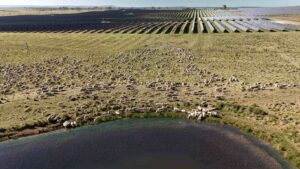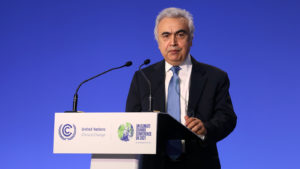AGL shareholders have delivered a blunt message to the company’s board about the need to dramatically reduce its emissions footprint, with a majority backing a call for AGL to adopt targets in line with the Paris Agreement and to prepare plans for how it will manage the transition from coal to zero emissions.
At its annual general meeting on Wednesday, a resolution calling on AGL to outline short, medium and long term strategies for dealing with greenhouse gas emissions, and link executive incentives to those targets, receiving the backing of around 55 per cent of shareholder votes.
It is believed to be the greatest support received for a shareholder motion on climate change measures, in defiance of a board’s recommendation to reject the motion.
Although it won’t be binding on AGL management – as it had been contingent on the success of an earlier motion that ultimately failed – it is a clear demonstration that shareholders are not happy with the company’s approach to climate change targets, and is a major rebuke of the AGL board.
The Australasian Centre for Corporate Responsibility (ACCR), which sponsored the motion put to the AGM, said the result sent a clear message to AGL management that emissions targets adopted by the company had to be aligned with the goals of the Paris Agreement.
And the ACCR’s Dan Gocher said that clearly meant shutting the last of its coal fired power stations by 2030, not in the late 2040s as currently envisaged.
“AGL has committed to publishing emissions reduction targets in the demerger scheme documents,” Gocher said. “Shareholders have demanded that those targets be Paris-aligned. According to the IEA and the IPCC, alignment with the Paris Agreement means closing coal-fired power stations by 2030.”

During the AGM, an attempt by a teenage climate change activist to be appointed to the AGL Energy board was unsuccessful.
Melbourne university student Ashjayeen Sharif had been nominated to fill a vacant spot on the AGL board, making a pitch to shareholders that he would accelerate AGL’s shift out of fossil fuel and towards investments in clean energy.
“I want to help steer AGL away from the coal burning power that is destroying the climate and AGL’s profitability, and towards clean and reliable renewable energy in order to give my generation and all those to come a shot at a safe future,” Sharif said.
“The AGL board has admitted that it failed to recognise the pace of change in the energy market. Renewables are taking the lead and AGL is not well placed to take advantage of the huge opportunities this presents.”
The AGL board had recommended that shareholders vote against the appointment of Sharif, citing a lack of previous experience and qualifications needed for the board. While his bid was unsuccessful, the 18-year-old still secured support from just over 2 per cent of proxy voters.
AGL is by far Australia’s largest greenhouse gas emitter, operating three of Australia’s largest coal generators in the Liddell, Bayswater and Loy Yang power stations.
While AGL has sought to grow its portfolio of clean energy assets, the company’s management admits it has been caught off-guard by the pace of change, and the speed with which the profitability of coal-fired power stations has been eroded due to the emergence of lower cost wind and solar.
AGL is currently progressing plans to split its company into two separate businesses; a retail-focused AGL Australia that will retail its electricity and gas retail business and the bulk of its clean energy portfolio, and Accel Energy which will hold the bulk of the company’s fossil fuel assets.
Environment and shareholder groups alike have raised concerns about the viability of establishing a new entity so heavily focused on fossil fuel assets without a plan to evolve the company in line with the Paris Agreement.
“Despite AGL’s blatant attempts to greenwash its image by splitting and rebranding, the fact remains that AGL is a coal burning company and will continue to be Australia’s biggest climate polluter under its current plan,” Greenpeace Australia Pacific CEO David Ritter said.
“The results of today’s votes show that shareholders are opposed to AGL’s plan to continue down the polluting and unprofitable path of burning more coal.
“Instead of slapping green lipstick on a pig, AGL should do the right thing for the young people of Australia and for its investors by closing its coal burning power stations and replacing them with renewables by 2030 at the latest.”
AGL chair Peter Botten conceded that the company’s financial performance had not been up to scratch and that shareholders were right to feel disappointed with a collapse in profitability that has sent the AGL share price plummeting.
AGL shares have fallen to their lowest level in several decades, shedding around 80 per cent of the company’s market capitalisation in the last two years as wholesale electricity prices collapsed.
In August, AGL reported more than $2 billion in losses – forced to write down the value of a significant proportion of its electricity contracts.
AGL CEO Graeme Hunt conceded the company had failed to anticipate the rapid pace of change, driven by a shift to cleaner energy sources, currently occurring in the Australian energy market.






